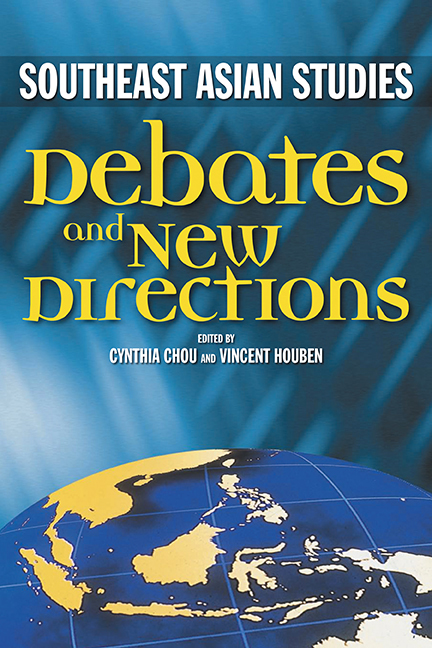Book contents
- Frontmatter
- Contents
- List of Contributors
- Preface
- 1 Introduction
- 2 Southeast Asia: Personal Reflections on a Region
- 3 Region, Academic Dynamics, and Promise of Comparitivism: Beyond Studying ‘Southeast Asia’?
- 4 Towards Multi-Laterality in Southeast Asian Studies: Perspectives from Japan
- 5 The Academic's New Clothes: The Cult of Theory versus the Cultivation of Language in Southeast Asian Studies
- 6 Rethinking Southeast Asian Politics
- 7 Reconceptualizing Southeast Asian Studies
- 8 Southeast Asian History: The Search for New Perspectives
- 9 Film, Literature, and Context in Southeast Asia: P. Ramlee, Malay Cinema, and History
- Bibliography
- Index
6 - Rethinking Southeast Asian Politics
Published online by Cambridge University Press: 21 October 2015
- Frontmatter
- Contents
- List of Contributors
- Preface
- 1 Introduction
- 2 Southeast Asia: Personal Reflections on a Region
- 3 Region, Academic Dynamics, and Promise of Comparitivism: Beyond Studying ‘Southeast Asia’?
- 4 Towards Multi-Laterality in Southeast Asian Studies: Perspectives from Japan
- 5 The Academic's New Clothes: The Cult of Theory versus the Cultivation of Language in Southeast Asian Studies
- 6 Rethinking Southeast Asian Politics
- 7 Reconceptualizing Southeast Asian Studies
- 8 Southeast Asian History: The Search for New Perspectives
- 9 Film, Literature, and Context in Southeast Asia: P. Ramlee, Malay Cinema, and History
- Bibliography
- Index
Summary
The study of Southeast Asian politics is a hybrid field, bringing together elements of the academic discipline of politics (known as political science in some traditions), and the inter-disciplinary field of area studies. Whereas the emphasis in the discipline of politics is on comparability – Southeast Asian politics is often seen as a sub-field of comparative politics – the emphasis in area studies is typically on distinctiveness. While many academics working on politics start with general theories and conceptual questions, those in area studies typically begin with specificities: Knowledge of languages, histories, and cultures which informs a spell of in-country fieldwork. In other words, the study of Southeast Asian politics contains a built-in contradiction, ripe with the potential for a clash of academic cultures. The clash here is not one between Western and Asian academic cultures – more of that later – but between two competing tendencies within the sub-field. Any academic who works on Southeast Asian politics without reference to wider theoretical debates, or who fails to link her or his research to well-constructed analytical arguments, will not gain acceptance as a credible social scientist. Yet academic specialists on the politics of Southeast Asia who fail to keep pace with empirical developments in the countries they study, and are known to spend little or no time in those countries, in turn lose their credibility as authoritative analysts of the region. In short, the life of the Southeast Asian politics specialist is a demanding one, beset by competing challenges.
These challenges are compounded by the sheer diversity of the region itself: Ten countries (now eleven with the advent of an independent East Timor) ranging from Singapore to Indonesia, from Brunei to Vietnam, with an enormous range of political systems embracing an absolute monarchy (Brunei), one-party communist states (Laos and Vietnam), a military dictatorship (Myanmar) and a wide range of partial democracies, façade democracies, and political orders in semi-permanent “transition”.
- Type
- Chapter
- Information
- Southeast Asian StudiesDebates and New Directions, pp. 102 - 122Publisher: ISEAS–Yusof Ishak InstitutePrint publication year: 2006



